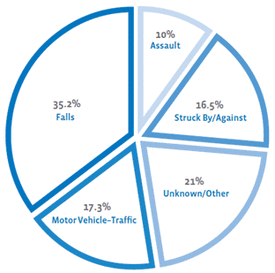|
Did you know that the average adult brain weighs only 3 pounds, a mere 2% of our body weight? Despite its small size, our brain uses one-fifth of the oxygen in our blood, and a quarter of the glucose/sugar that circulates in our bloodstream. Our brain is the seat of all of our thoughts, emotions, behavior, and personality - all of which are the product of a concert of communication conducted by the more than 100 billion cells in the brain, called neurons. Each of these neurons can communicate with up to 1,000 others by using chemical signals called neurotransmitters. Amazing, indeed!
|
|
Traumatic brain injury (TBI) refers to damage or destruction of brain tissue due to a blow to the head. A more specific definition has been developed by the TBI Model Systems (TBIMS), a group of 14 medical centers funded by the National Institute on Disability and Rehabilitation Research (NIDRR). The TBIMS works to maintain and improve a cost-effective, comprehensive service delivery system for people who experience a traumatic brain injury (TBI), from the moment of their injury and throughout their life span. The University of Alabama at Birmingham is a TBI Model System site, and you can visit their web page here.
The criteria established by the TBIMS states that for someone to have a TBI, one of the following must happen:
The criteria established by the TBIMS states that for someone to have a TBI, one of the following must happen:
- The person experienced loss of consciousness. This can be very brief or it can be very long.
- The person has amnesia for the event, meaning they experience difficulty remembering the actual event.
- A Glasgow Coma Scale (GCS) score of less than 15 during the first 24 hours after the injury, meaning that there was a disturbance in the person's ability to be consciously alert and aware of what was happening around them (e.g., confusion).
- The presence of a skull fracture, post-injury seizure, or a CT scan (computerized tomography) or MR
|
According to the US Centers for Disease Control and Injury Prevention, over 1.7 million people each year sustain a traumatic brain injury. According to the Alabama Head Injury Foundation, pproximately 10,000 Alabamians sustain a TBI each year, and of that number 500 die or 1,500 become disabled. Fortunately, the vast majority of these injuries (75% nationally per the CDC) are of mild severity. These individuals are very likely to experience a full recovery, with no lasting difficulties.
Who is most at risk for a TBI? According to CDC statistics, you are most likely to experience a TBI if you are between the ages of 0 to 4 years, 15 to 19 years, or are over the age of 65. Across all ages, men are more likely to experience a TBI than women. The most common reasons for experiencing TBI include falls, motor vehicle collisions, and assault, among others. Falls cause half (50%) of the TBIs among children ages 0 to 14 years and over half (61%) of the TBIs among adults aged 65 and older. Although motor vehicle collisions aren't the leading cause of TBI, they result in the largest percentage of TBI-related deaths (31.8%). |
Because our brains are responsible for so many different things, it makes sense that when they are injured we might experience a broad array of symptoms. What kind and for how long a person experiences these symptoms depends on a number of factors such as cause of injury, location of the injury, injury severity, and whether the person experienced any post-injury complications like seizures or swelling.
Physical:
- Headaches
- Neck pain - Dizziness - Nausea/vomiting - Visual changes - Hearing changes - Other sensory changes (touch, smell) - Gross motor problems (walking, balance) - Fine motor problems (talking, using hands) |
Cognitive:
- Slower to do or think things through
- Restless and easily distracted - Concentrating for long periods of time - Easily losing train of thought - Understanding (e.g., directions, movies, jokes) - Solving complicated problems - Trouble with multi-tasking - Trouble planning and organizing - Being able to learn and remember new information |
Psychological:
- Sadness/Depression
- Worry/Anxiety - Low self-esteem - Social withdrawal and loneliness - Anger/Irritability - Changes in personality: aggressive, impulsive, self-centered, or inappropriate behavior - Sleep disturbance |
©2012. The AlabamaTBI.org website is supported in part by AL H21MC06738 from the Department of Health and Human Services Health Resources and Services Administration, Maternal and Child Health Bureau. The contents are the sole responsibility of the authors and do not necessarily represent the official views of DHHS.






